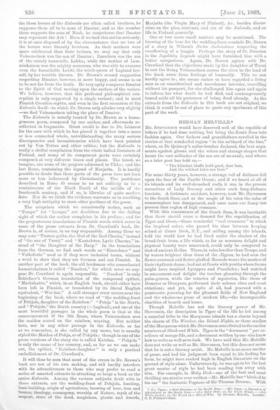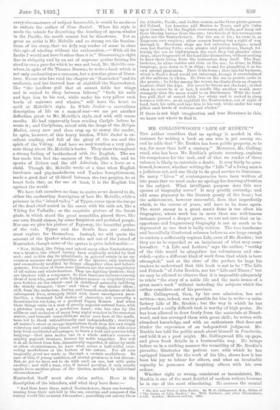HERMAN MELVILLE.* Mu. STEVENSON would have deserved well of the
republic of letters if he had done nothing but bring th6 South Seas into fashion again. Our fathers and grandfathers revelled in the stories of that wonderful region "to the su'tha.rd of the line," where, as De Quincey's sailor-brother declared, the best argu- ments against ghosts and the voices and strange shapes that haunt the vast solitudes of the sea are of no avail; and where, as a later poet has told us,—
" The blindest bluffs hold good, dear lass,
And the wildest tales are true."
For some thirty years, however, a strange veil of dullness fell upon the face of the Pacific Ocean ; and if we heard at all of its islands and its surf-drenched reefs, it was in the prosaic narratives of Lady Brassey and other such long-distance tourists. A fortunate accident, however, took Mr. Stevenson to the South Seas, and at the magic of his voice the calm of commonplace has disappeared, and once more our fancy can possess that region of high romance.
With this renaissance of the South Seas, it was inevitable that there should come a demand for the republication of Types and Omoo,—those wonderful " real romances" in which the inspired usher, who passed his time between keeping school at Green Bush, N.Y., and sailing among the islands, told the world how he had lived under the shadow of the bread-fruit trees, a life which, as far as sensuous delight and physical beauty were concerned, could only be compared to that of ancient Hellas. There, in vales lovelier than Tempe, and by waters brighter than those of the 2Egean, he had seen the flower-crowned and flower-girdled Maneads weave the meshes of their rhythmic dance; had sat at feasts with youths whose forms might have inspired Lysippus and Praxiteles ; had. watched in amazement and delight the torches gleaming through the palm-groves, while the votaries of mysteries, like those of Demeter or Dionysus, performed their solemn rites and meet oblations ; and yet, in spite of all, had yearned with a passionate yearning for the pleasant fields of New England and the wholesome prose of modern life,—the incomparable charities of hearth and home.
Though Melville has not the literary power of Mr. Stevenson, the description in Types of the life he led among a cannibal tribe in the Marquesas islands has a charm beyond the charm of The Wrecker, the Island Nights, or those studies of the Marquesas which Mr. Stevenson contributed to the earlier numbers of Black and White. Types is the " document " par ex- cellence of savage life, and a document written by one who knew how to write as well as to look. We have said that Mr. Melville does not write as well as Mr. Stevenson, but this does not mean that he is not a literary artist. Mr. Melville is no mean master of prose, and had his judgment been equal to his feeling for form, he might have ranked high in English literature on the ground of style alone. Unfortunately, he was apt to let the last great master of style he had been reading run away with him. For example, in Moby Dick—one of the best and most thrilling sea-stories ever written—Mr. Melville has "hitched to. his car the fantastic Pegasus of Sir Thomas Browne. With
* (1.) Tyree t a Beal Romance of tho South Soas.—(2 ) Ontoo : a Narrative of Adventures Ot Cl,, South Soas.--(30 Mal; Dia; or, the Whito Whale.— (44 White .Tacitet ; or, the World ott a Man.of- War, By Herman Idelvilte. London: G. P. Putnam's Sons.
every circumstance of subject favourable, it would be madness to imitate the author of Urns Burial. When his style is made the vehicle for describing the hunting of sperm-whales in the Pacific, the result cannot but be disastrous. Yet so great an artist is Mr. Melville and so strong are the fascina- tions of his story, that we defy any reader of sense to close this epic of whaling without the exclamation,—" With all its faults I would not have it other than it is." Discovering a right line in obliquity and by an act of supreme genius forcing his steed to run a pace forwlaich he was not bred, Mr. Melville con- trives, in spite of Sir Thomas Browne, to write a book which is not only enchanting as a romance, but a genuine piece of litera- ture. No one who has read the chapter on "Nantucket" and its seafarers, and has learned how at nightfall the Nantucketer, like "the landless gull that at sunset folds her wings and is rooked to sleep between billows," "furls his sails and lays him to his rest, while under his very pillow rush herds of walruses and whales," will have the heart to cavil at Melville's style. In White Jacket—a marvellous description of life on a man-of-war—we see yet another deflection given to Mr. Melville's style, and with still worse results. He had apparently been reading Carlyle before he wrote it ; and Carlylisms, mixed with the dregs of the Beligio Medici, every now and then crop up to annoy the reader. In spite, however, of this heavy burden, White Jacket is ex- cellent reading, and full of the glory of the sea and the spirit of the Viking. And here we may mention a very plea- sant thing about Mr. Melville's books. They show throughout a strong feeling of brotherhood with the English. The sea has made him feel the oneness of the English kin, and he speaks of Nelson and the old Admirals like a lover or a child. Though Mr. Melville wrote at a time when English insolence and pig-headedness, and Yankee bumptiousness, made a good deal of ill-blood between the two peoples, he at heart feels that, on the sea at least, it is the English kin against the world.
We have left ourselves no time to quote, as we desired to do, either the enchanting description of how Mr. Melville, while a prisoner in the " island valley" of Typee, came upon the image of the dead chief seated in his canoe with his sails set, like a Viking for Valhalla ; or the exquisite picture of the forest glade, in which stood the great monoliths, placed there, like our own Druid stones, by some forgotten and perished people. Nor can we give his picture of Fayassray, the beautiful genius of the vale. Typee and the South Seas our readers must explore for themselves. Instead, we will quote the account of the Quaker whalers who sail out of the Island of Nantucket, though some of the syntax is quite indefensible:—
" Now, Elided, like Peleg, and indeed many ether Nantucketers, was a Quaker, the island having been originally settled, by that sect ; and to this day its inhabitants in general retain in an un- common measure the peculiarities of the Quaker, only variously and anomalously modified by things altogether alien and hetero- geneous. For some of these same Quakers are the most sanguinary of all sailors and whale-hunters. They are fighting Quakers ; they are Quakers with a vengeance. So that there are instances among them of men who, named with Scripture names—a singularly com- mon fashion on the island—and in childhood naturally imbibing the stately dramatic thee ' and 'thou' of the Quaker idiom ; still, from the audacious, daring, and boundless adventure of their subsequent lives, strangely blend with these unoutgrown pecu- liarities, a thousand bold dashes of character, not unworthy a Scandinavian sea-king, or a poetical Pagan Roman. And when these things unite in a man of greatly superior natural force, with a globular brain and a ponderous heart ; who has also by the stillness and seclusion of many long night-watches in the remotest waters, and beneath constellations never soon here at the north, been led to think untraditionally and independently ; receiving all nature's sweet or savage impressions fresh from her own virgin voluntary and confiding breast, and thereby chiefly, but with some help from accidental advantages, to learn a bold and nervous lofty language—that man makes one in a whole nation's census—a mighty pageant `6reature, formed for noble tragedies. Nor will it at all detract from him, dramatically regarded, if either by birth or other circumstances, he have what seems a half-wilful over- ruling morbidness at the bottom of his nature. For all men tragically great are made so through a certain morbidness. Be sure of this, 0 young ambition, all mortal greatness is but disease. But, as yet we have not to do with such an one, but with quite another ; and still a man, who, if indeed peculiar, it only results again from another phase of the Quaker, modified by individual circumstances."
Nantucket itself must also claim notice. Here is the description of the islanders, and what they have done:—
"And thus have these naked Nantucketers, these sea-hermits, issuing from their ant-hill in the sea, overrun and conquered the watery world like so many Alexanders ; parcelling out among them the Atlantic, Pacific, and Indian oceans, as the three pirate powers did Poland. Let America add Mexico to Texas, and pile Cuba upon Canada ; let the English overswarm all India, and hang out their blazing banner from the sun ; two-thirds of this terraqueous globe are the Nantucketer's. For the sea is his ; he owns it, as Emperors own empires ; other seamen having but a right of way through it. Merchant ships are but extension bridges ; armed ones but floating forts ; even pirates and privateers, though fol- lowing the sea as highwaymen the road, they but plunder other ships, other fragments of the land like themselves, without seeking to draw their living from the bottomless deep itself. The Nan- tucketer, he alone resides and riots on the sea ; he alone, in Bible language, goes down to it in ships ; to and fro ploughing it as his own special plantation. There is his home ; there lies his business, which a Noah's flood would not interrupt, though it overwhelmed all the millions in China. He lives on the sea as prairie cocks in the prairie ; he hides among the waves, he climbs them as chamois hunters climb the Alps. For years he knows not the land ; BO that when he comes to it at last, it smells like another world, more strangely than the moon would to an Earthsman. With the land- less gull, that at sunset folds her wings and is rocked to sleep between billows ; so at nightfall the Nantucketer, out of sight of land, furls his sails, and lays him to his rest, while under his very pillow rush herds of walruses and whales."
If there is not high imagination and true literature in this, we know not where to find it.



















































 Previous page
Previous page